St. Francis of Assisi Weekly Reflections

Invited to the Feast
08-31-2025Weekly ReflectionWe Celebrate Worship Resource, Vol. 49, No. 1Jesus loves to tell parables about banquets and feasts, doesn't he? In the one we hear today, a guest takes a prominent seat at the table, only to be directed, embarrassingly, to the lowest place instead. Jesus praises the guest who sits humbly and then is invited to a higher position.
He has a lesson to the host as well: Do not invite those who will repay you by inviting you to their own feasts, but the poor and forgotten, who have no way to repay you. "You will be repaid," Jesus concludes, in a much better way: "at the resurrection of the righteous" (Luke 14:14).
Jesus invites us all to the heavenly banquet, an offer we have no ability to return in kind. Or do we? Recall that Jesus teaches that what we do for the least of our brothers and sisters we do for him. Therefore, we repay him by feeding and clothing and visiting and caring for the Christ in those who cannot personally repay us. In lavishing our prosperity on those in need, we invite Christ to a banquet.
When you give yourself to someone in need, do you feel your reward in your heart? What will you do this week for someone in need?
-We Celebrate Worship Resource, Vol. 50, No. 3
Invitado a la Fiesta
A Jesús le encanta contar parábolas sobre banquetes y fiestas, ¿verdad? En la que escuchamos hoy, un invitado ocupa un lugar destacado en la mesa, solo para ser dirigido, vergonzosamente, al último lugar. Jesús elogia al invitado que se sienta humildemente y luego es invitado a una posicion mas alta.
Tambien tiene una lección para el anfitrión: No invites a quienes te recompensarán invitándote a sus propios banquetes, sino a los pobres y olvidados, que no tienen con qué recompensarte. "Serás recompensado", concluye Jesus, de una manera mucho mejor: "cuando resuciten los justos" (Lucas 14:14).
Jesús nos invita a todos al banquete celestial, una oferta que no podemos devolver con la misma moneda. ¿O sí? Recordemos que Jesús enseña que lo que hacemos por el mas pequeno de nuestros hermanos y hermanas, lo hacemos por él. Por lo tanto, le pagamos alimentando, vistiendo, visitando y cuidando a Cristo en aquellos que no pueden correspondernos personalmente. Al prodigar nuestra prosperidad a los necesitados, invitamos a Cristo a un banquete.
¿Cuando te entregas a alguien necesitado, ¿sientes la recompensa en tu corazon? ¿Que haras esta semana por alguien necesitado?
-We Celebrate Worship Resource, Vol. 50, No. 3
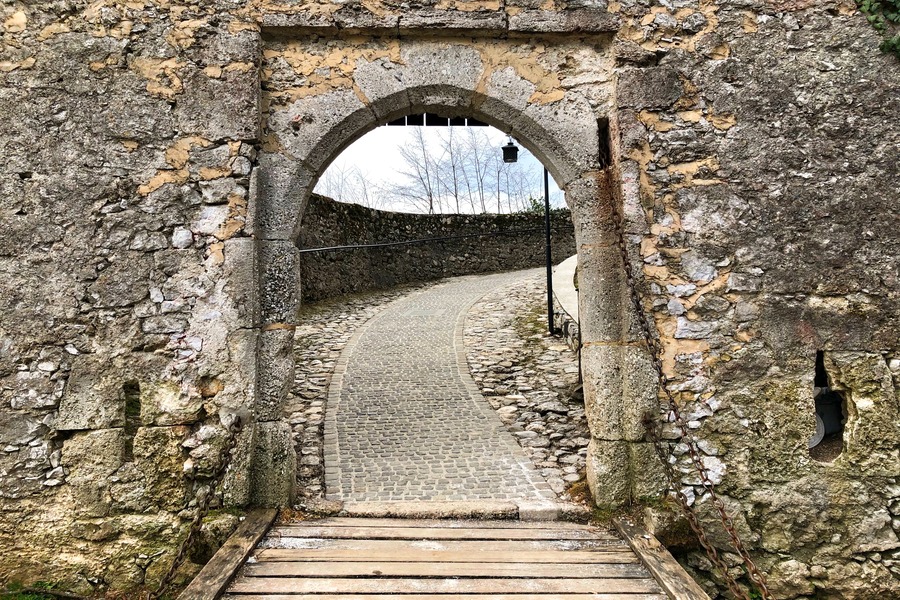
The Narrow Gate
08-24-2025Weekly ReflectionWe Celebrate Worship Resource, Vol. 49, No. 1It's a perfectly normal question to ask Jesus: "Lord, will only a few people be saved?" (Luke 13:2) In other words, what are my chances of making it to heaven? Jesus responds, "Strive to enter through the narrow gate, for many, I tell you, will attempt to enter but will not be strong enough" (13:24). Neither "narrow gate" nor "not strong enough" sounds good, and neither does the story of those refused entry, left wailing and grinding their teeth.
But perhaps by not giving a straight answer, Jesus is telling us more. First, that it is important to strive to make it to heaven. We should repent, pray, do good, love God and neighbor, and serve the least of our brothers and sisters. Namely, we must live our faith. And second, to teach that none of us alone is strong enough, but by God's grace we all can enter the narrow gate.
This gives us hope, for no matter how much we strive, we are human, imperfect and weak. Let us pray that by the grace of God there may be a constant flood, "from the east and the west, from the north and the south," through that narrow gate (13:29).
What can you do to strive to enter through the narrow gate?
-We Celebrate Worship Resource, Vol. 50, No. 3
La Puerta Estrecha
Es perfectamente normal preguntarle a Jesús: «Señor, ¿se salvarán pocos?» (Lucas 13:2). En otras palabras, ¿qué posibilidades tengo de llegar al cielo? Jesús responde: «Esfuércense por entrar por la puerta estrecha, porque les digo que muchos intentaran entrar, pero no serán lo suficientemente fuertes» (13:24). Ni «puerta estrecha» ni «no lo suficientemente fuertes» suenan bien, como tampoco lo es la historia de quienes se quedaron llorando y rechinando los dientes.
Pero quizás al no dar una respuesta directa, Jesús nos está diciendo más. Primero, que es importante esforzarse por llegar al cielo. Debemos arrepentirnos, orar, hacer el bien, amar a Dios y al prójimo, y servir a los más pequeños. Es decir, debemos vivir nuestra fe. Y segundo, enseñar que nadie es lo suficientemente fuerte solo, sino que por la gracia de Dios todos podemos entrar por la puerta estrecha.
Esto nos da esperanza, porque por mucho que nos esforcemos, somos humanos, imperfectos y debiles. Oremos para que por la gracia de Dios haya un diluvio constante, "del oriente y del occidente, del norte y del sur", a través de esa puerta estrecha (13:29).
¿Que puedes hacer para esforzarte en entrar por la puerta estrecha?
-We Celebrate Worship Resource, Vol. 50, No. 3

Set the Earth on Fire
08-17-2025Weekly ReflectionWe Celebrate Worship Resource, Vol. 49, No. 1How do you think Jeremiah felt after the princes of Judah threw him into a cistern and left him to die? As death by starvation came closer, did he regret speaking out in God's name? Clearly he did not, for after he is rescued and after today's first reading ends, he continues to warn the people of God's wrath. Jeremiah is ready to pay any price for speaking the truth. Jesus is too.
He realizes that preaching about a kingdom in which the first will be last, the lofty will be thrown down from their thrones, and the poor and the persecuted will be the ones to inherit it is divisive. But this is why he has come. That the message is divisive and leads to persecution is not a sign that it should be silenced-just the opposite.
Therefore, he welcomes the blazing fire, the divided households, the baptism that will be his death on the cross. These are signs that he is accomplishing his mission. It is our turn now to preach his message and face opposition. But we do so knowing that as "the leader and perfecter of faith," Jesus is our model as we "persevere in running the race" to that kingdom. (Hebrews 12:1-2)
Have you spoken up for justice, truth, or your faith when you know it will be divisive? When do you plan to do so?
-We Celebrate Worship Resource, Vol. 50, No. 3
Traer Fuego a la Tierra
¿Cómo creen que se sintió Jeremías después de que los príncipes de Judá lo arrojaran a una cisterna y lo dejaran morir? Al acercarse a la muerte por hambre, ¿se arrepintio de hablar en nombre de Dios? Claramente no, pues tras ser rescatado y al terminar la primera lectura de hoy, continua advirtiendo al pueblo de la ira de Dios. Jeremías está dispuesto a pagar cualquier precio por decir la verdad. Jesus también.
Es consciente de que predicar sobre un reino en el que los primeros seran los ultimos, los encumbrados seran derribados de sus tronos y los pobres y perseguidos seran quienes lo hereden, causa división. Pero para eso ha venido. Que el mensaje cause division y conduzca a la persecucion no es señal de que deba silenciarse, sino todo lo contrario.
Por eso, acoge con agrado el fuego ardiente, los hogares divididos, el bautismo que sera su muerte en la cruz. Estas son señales de que esta cumpliendo su mision. Ahora nos toca a nosotros predicar su mensaje y enfrentar la oposicion. Pero lo hacemos sabiendo que, como "el líder y consumador de la fe", Jesús es nuestro modelo a medida que "perseveramos en la carrera" hacia ese reino. (Hebreos 12:1-2)
¿Has defendido la justicia, la verdad o tu fe sabiendo que generará divisiones? ¿Cuándo planeas hacerlo?
-We Celebrate Worship Resource, Vol. 50, No. 3

In God We Trust
08-10-2025Weekly ReflectionWe Celebrate Worship Resource, Vol. 49, No. 1"In God we trust." What do you think of when you hear that phrase? Probably money, since that sentence appears on all U.S. currency. Appropriate, seemingly, for it is money in which we often place the most trust. It can provide for our material needs and give us peace of mind for the future, much as the rich man in last Sunday's Gospel or Jesus' disciples in today's believed it would.
But Jesus tells them no, their true treasure is in heaven, inexhaustible and imperishable. They only need trust in God. The authors of both Wisdom and Hebrews recall the trust their forebears had in God, to deliver them out of slavery, to provide descendants as numerous as the stars.
Their powerful faith, which led Abraham to believe that God must even have the power to raise the dead when he was asked to sacrifice Isaac, was now needed by Luke's audience, for they had begun to doubt that Jesus would return as he had promised. Even now, after two thousand years, the master in Jesus' parable has yet to return.
So we are challenged to keep the faith as well, to seek our treasure in the kingdom of heaven and not the kingdom of wealth, and to acclaim truly, "In God we trust."
How do you show your trust in God?
-We Celebrate Worship Resource, Vol. 50, No. 3
En Dios Confiamos
"En Dios confiamos." ¿Qué te viene a la mente cuando escuchas esa frase? Probablemente, dinero, ya que aparece en toda la moneda estadounidense. Apropiado, al parecer, pues es en el dinero en el que a menudo depositamos nuestra mayor confianza. Puede cubrir nuestras necesidades materiales y darnos tranquilidad para el futuro, tal como creían el hombre rico del Evangelio del domingo pasado o los discípulos de Jesús en el de hoy.
Pero Jesus les dice que no, que su verdadero tesoro está en el cielo, inagotable e imperecedero. Solo necesitan confiar en Dios. Los autores de la Sabiduría y de Hebreos recuerdan la confianza que sus antepasados tenían en Dios para liberarlos de la esclavitud y darles una descendencia tan numerosa como las estrellas.
Su poderosa fe, que llevo a Abraham a creer que Dios debía tener el poder incluso de resucitar a los muertos cuando se le pidió que sacrificara a Isaac, ahora era necesaria para la audiencia de Lucas, pues habían comenzado a dudar del regreso de Jesus como lo había prometido. Incluso ahora, después de dos mil años, el maestro de la parábola de Jesús aún no ha regresado.
Así que estamos desafiados a mantener la fe tambien, a buscar nuestro tesoro en el reino de los cielos y no en el reino de las riquezas, y aclamar verdaderamente: "En Dios confiamos".
¿Como demuestras tu confianza en Dios?
-We Celebrate Worship Resource, Vol. 50, No. 3
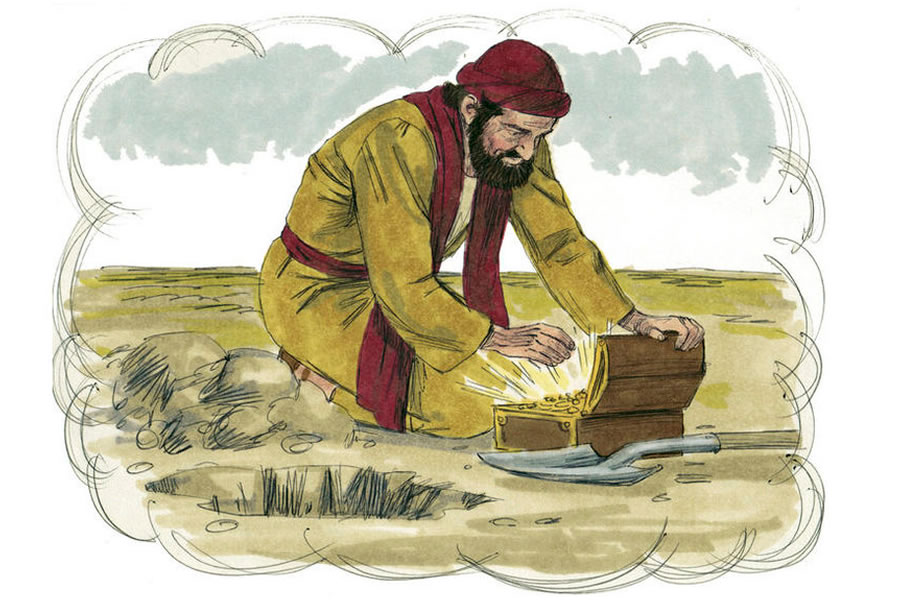
Where Are Your Riches?
08-03-2025Weekly ReflectionWe Celebrate Worship Resource, Vol. 49, No. 1"Are you saving enough for ...? " We hear this question throughout our lives, about buying a home, paying for college for our children, or retirement. Today's readings offer a different view, pointing out the folly of obsessing over the pursuit of wealth. "All things are vanity!" says Qoheleth, pointing out that when we die, all our possessions will be left to someone who never worked for them or worried over them (Ecclesiastes 1:2).
Jesus' parable teaches the same lesson. The rich man whose harvest would satisfy all his material needs for years dies that very night. After all that planning! Where did he go wrong? A clue may be found in the word Jesus used to describe that harvest: bountiful. Bounty is something given generously.
The rich man seemed to think of the earth's bounty as something he deserved to possess and could hoard, not as a gift that he could in turn give. "Think of what is above, not of what is on earth," Saint Paul writes (Colossians 3:2), for what is important is not an accumulation of riches in this life, but eternal life in heaven. We are all offered the bounty of salvation; everything else we gain will pass.
What do you value the most? Where are your riches?
-We Celebrate Worship Resource, Vol. 50, No. 3
¿Dóndeestán Tusriquezas?
¿Estás ahorrando lo suficiente para ...? " Escuchamos esta pregunta a lo largo de nuestras vidas, ya sea al comprar una casa, pagar la universidad de nuestros hijos o la jubilación. Las lecturas de hoy ofrecen una perspectiva diferente, señalando la insensatez de obsesionarse con la búsqueda de riquezas. "¡Todo es vanidad!", dice Cohélet, señalando que cuando muramos, todas nuestras posesiones pasarán a manos de alguien que nunca trabajó por ellas ni se preocupó por ellas (Eclesiastés 1:2).
La parábola de Jesús enseña la misma leccion. El hombre rico cuya cosecha satisfaría todas sus necesidades materiales durante años muere esa misma noche. ¡Despues de tanta planificación! ¿Dónde se equivocó? Una pista puede encontrarse en la palabra que Jesús usó para describir esa cosecha: abundante. La abundancia es algo que se da generosamente.
El hombre rico parecía pensar en la abundancia de la tierra como algo que merecía poseer y podía acumular, no como un regalo que a su vez podía dar. "Pensad en las cosas de arriba, no en las de la tierra", escribe San Pablo (Colosenses 3:2), pues lo importante no es acumular riquezas en esta vida, sino la vida eterna en el cielo. A todos se nos ofrece la recompensa de la salvación; todo lo demás que obtengamos pasará.
¿Qué es lo que más valoras? ¿Dónde están tus riquezas?
-We Celebrate Worship Resource, Vol. 50, No. 3

Seek and You Will Find
07-27-2025Weekly ReflectionWe Celebrate Worship Resource, Vol. 49, No. 1Proving that it never hurts to ask, Abraham repeatedly asks God how many innocent people would there have to be in a city to change God's mind about destroying it. It appears Jesus would agree with this approach as well, as he gives an example of a desperate person awakening a friend's entire household at midnight to ask for three loaves of bread.
That God welcomes persistent requests at any hour is reassuring, but perhaps there is more to be learned here. By effectively asking God to show greater and greater mercy by progressively lowering the number of innocent by standards, Abraham learns that God is indeed much more merciful than he originally thought. More creative, too.
After all the examples Jesus gives of asking and receiving, he tells his disciples that the Father will give the Holy Spirit to those who ask. Who would have ever thought to ask for the third person of the Trinity? Perhaps Jesus is trying to teach his disciples and us that God answers our prayers in ways both unimaginable and overwhelming.
When we ask for "our daily bread" and "forgive us our sins," God gives us living bread and eternal redemption. No, indeed, it never hurts to ask.
What do you look for as an answer to your prayers?
-We Celebrate Worship Resource, Vol. 50, No. 3
Busca Y Encontraras
Demostrando que nunca está de más pedir, Abraham le pregunta repetidamente a Dios cuántas personas inocentes tendría que haber en una ciudad para que Dios cambiara de opinión sobre destruirla. Parece que Jesús también estaría de acuerdo con este enfoque, ya que da el ejemplo de una persona desesperada que despierta a toda la casa de un amigo a medianoche para pedirle tres panes.
Que Dios reciba peticiones persistentes a cualquier hora es reconfortante, pero quizás haya más que aprender aquí. Al pedirle a Dios con eficacia que muestre cada vez mayor misericordia, reduciendo progresivamente el número de inocentes según los estándares, Abraham aprende que Dios es, de hecho, mucho más misericordioso de lo que originalmente creía. Más creativo, también.
Después de todos los ejemplos que Jesús da de pedir y recibir, les dice a sus discípulos que el Padre dará el Espíritu Santo a quienes lo pidan. ¿Quién hubiera pensado en pedir a la tercera persona de la Trinidad? Quizás Jesús intenta enseñarles a sus discípulos y a nosotros que Dios responde a nuestras oraciones de maneras inimaginables y abrumadoras.
Cuando pedimos "nuestro pan de cada día" y "perdónanos nuestros pecados", Dios nos da el pan vivo y la redención eterna. No, de hecho, nunca está de más pedir.
¿Que buscas como respuesta a tus oraciones?
-We Celebrate Worship Resource, Vol. 50, No. 3
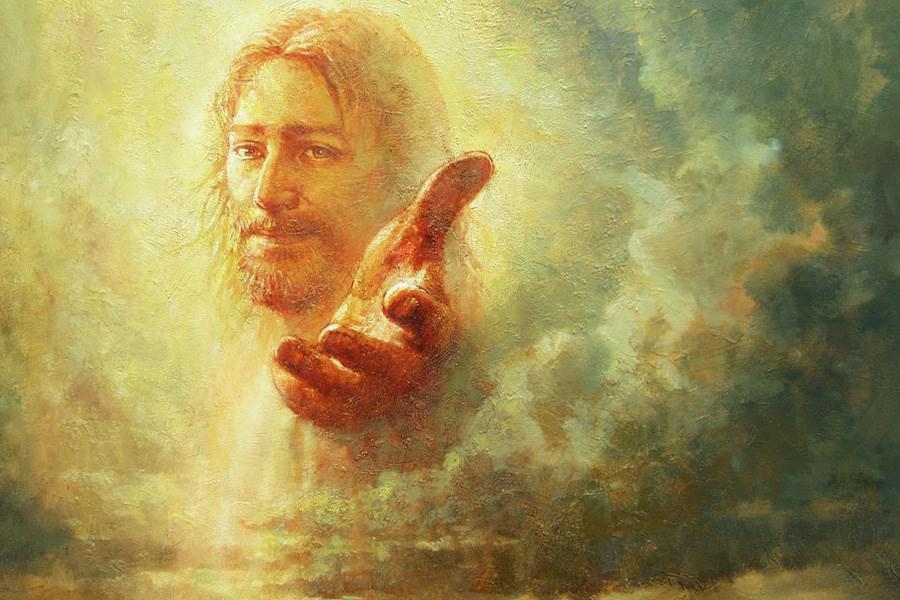
Unexpected Encounters with Jesus
07-20-2025Weekly ReflectionWe Celebrate Worship Resource, Vol. 49, No. 1Abraham does not realize that he is encountering the Lord when he welcomes three traveling strangers that hot afternoon. He invites them to eat, drink, and rest, providing hospitality above and beyond what was expected in his culture. Only after one of the visitors tells him that his elderly wife Sarah will bear a son does Abraham realize who they are.
Similarly, Paul had certainly not expected to encounter the Lord on his way to Damascus to arrest more Christians. But after the risen Lord reveals himself, he tells Paul that he has chosen him to proclaim his name to all people, Jews and Gentiles alike, and to reveal the "mystery hidden from ages and from generations past": that salvation is offered to all, that all may be perfect in Christ (Colossians 1:26).
Mary may have known of Jesus when her sister Martha welcomed him into their home, but the way he holds her spellbound suggests that she had not anticipated such a powerful encounter with him. On any given day we too may be surprised when we encounter the Lord, whether in prayer, in God's word, in our neighbor in need, or in the Eucharist.
May we welcome him as well, choosing to spend time in his presence, for this is "the better part and it will not be taken from [us]" (Luke 10:42). When have you been surprised by the Lord's presence in a special way?
-We Celebrate Worship Resource, Vol. 50, No. 3
Encuentros Inesperados Con Jesús
Abraham no se da cuenta de que se encuentra con el Senor cuando le da la bienvenida a tres extraños que viajan esa tarde calurosa. Los invita a comer, beber y descansar, proporcionando hospitalidad mas allá de lo esperado en su cultura. Solo después de que uno de los visitantes le dice que su anciana esposa Sarah tendrá un hijo, es que Abraham se da cuenta de quiénes son.
Del mismo modo, Pablo ciertamente no había esperado encontrarse con el Senor en su camino a Damasco para arrestar a más cristianos. Pero después de que el Señor resucitado se revela, le dice a Pablo que lo ha elegido para que proclame su nombre a todas las personas, judíos y gentiles por igual, y que revele el "misterio que había estado oculto desde los siglos y edades": que la salvación es para todos, que todos pueden ser perfectos en Cristo (Colosenses 1:26).
María puede haberlo sabido de Jesus cuando su hermana Marta lo recibió en su casa, pero la forma en que mantiene su atención sugiere que no había anticipado un encuentro tan poderoso con el. En cualquier día determinado, nosotros tambien podemos sorprendernos cuando nos encontramos con el Senor, ya sea en oracion, en la Palabra de Dios, en nuestro prójimo necesitado o en la Eucaristía.
Que podamos darle la bienvenida también, eligiendo pasar tiempo en su presencia, ya que esta es "la mejor parte y la cual no le será quitada" (Lucas 10:42). ¿Cuando te ha sorprendido la representación del Señor de una manera especial?
-We Celehrate Worship Resource, Vol. 50, No. 3

Live the Law of Love
07-13-2025Weekly ReflectionWe Celebrate Worship Resource, Vol. 49, No. 1When we hear the word love, we tend to think of the tender feeling we have for our spouse or significant other or those closest to us. But Jesus reminds us today that love is much more than a feeling. Love requires doing. After Jesus affirms that in order to inherit eternal life we must love our neighbor as ourselves, the lawyer asks, "And who is my neighbor?" (Luke 10:29).
In his story of the good Samaritan, Jesus clearly broadens the concept of neighbor, which at the time it was used in the Torah-"You shall love your neighbor as yourself" (Leviticus 19:18)-was thought to mean one's fellow Israelite. But he also broadens the concept of love.
Yes, Jesus says that the Samaritan feels compassion, but he goes into much greater detail about everything the Samaritan does out of love: stopping and approaching the injured man, treating and bandaging his wounds, lifting him up on his animal, taking him to an inn, caring for him all through the night, and paying the innkeeper generously.
This is what love really is. This is how we love our neighbor and love God.
What will you do this week to put love for someone else into action?
-We Celebrate Worship Resource, Vol. 50, No. 3
Vivan la Ley del Amor
Cuando escuchamos la palabra amor, solemos pensar en el tierno sentimiento que sentimos por nuestro cónyuge, pareja o seres queridos. Pero Jesús nos recuerda hoy que el amor es mucho más que un sentimiento. Amar requiere acción. Después de que Jesús afirma que para heredar la vida eterna debemos amar a nuestro prójimo como a nosotros mismos, el intérprete de la ley pregunta: "¿Y quién es mi prójimo?" (Lucas 10:29).
En su historia del buen samaritano, Jesús amplía claramente el concepto de prójimo, que en su época se usaba en la Torá: "Amarás a tu prójimo como a ti mismo" (Levítico 19:18), se pensaba que se refería a nuestro compatriota israelita. Pero también amplía el concepto de amor.
Sí, Jesús dice que el samaritano siente compasión, pero detalla mucho más todo lo que hace por amor: detenerse y acercarse al herido, curar y vendar sus heridas, subirlo a su caballo, llevarlo a una posada, cuidarlo toda la noche y pagar generosamente al posadero.
Esto es realmente el amor. Así es como amamos al prójimo y a Dios.
¿Qué harás para ayudar a manifestar el reino de Dios en este mundo?
-We Celebrate Worship Resource, Vol. 50, No. 3
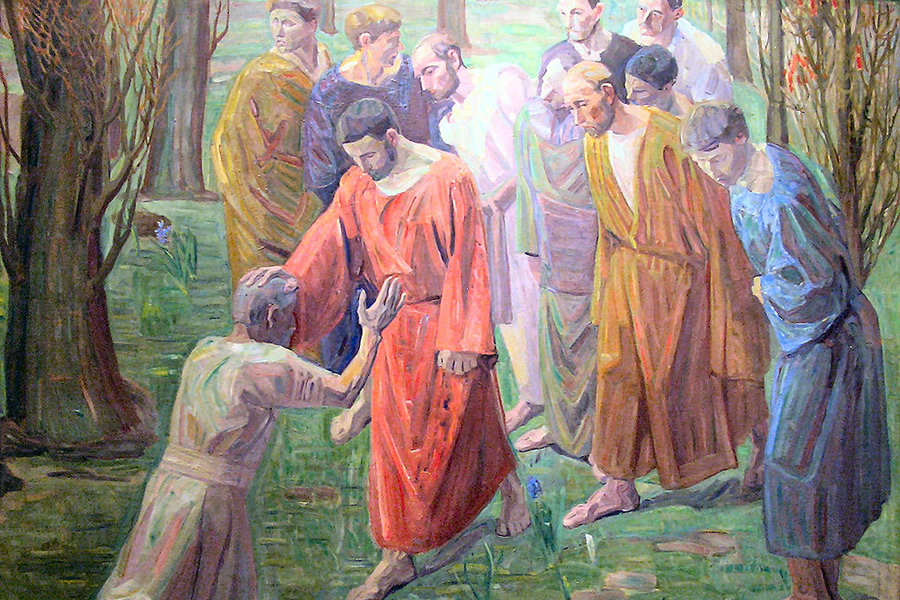
The Laborers are Few
07-06-2025Weekly ReflectionWe Celebrate Worship Resource, Vol. 49, No. 1The harvest is abundant," Jesus begins, likely sending feelings of joy and anticipation rippling through the gathering (Luke 10:2). "But the laborers are few," he continues, "Behold, I am sending you like lambs among wolves" (10:2-3). That puts a damper on things! Then he sends them off on this daunting work with nothing more than the clothes on their backs.
But he has given them something much greater than what they could put in a money bag or sack: the power to proclaim that the kingdom of God is near. Indeed, they return rejoicing, having cured the sick and driven out demons. These are truly signs of the kingdom. We are those laborers for the kingdom now. We can bring peace to our households by offering forgiveness and understanding. We can heal suffering by giving comfort and care to those in need.
We can drive out the demons of sin, injustice, and oppression when we work to defeat them. It is not easy. Saint Paul attests to that when he says that he bears the marks of Jesus on his body. But the reward is great, for the power of Jesus' cross, of which Paul boasts, makes God's harvest of souls into the kingdom abundant.
What will you do to help manifest the kingdom of God in this world?
-We Celebrate Worship Resource, Vol. 50, No. 3
Los Obreros son Pocos
La cosecha es abundante", comienza Jesús, probablemente infundiendo alegría y anticipación en la reunión (Lucas 10:2). "Pero los obreros son pocos", continúa, "iMiren, los envío como corderos en medio de lobos!" (10:2-3). ¡Eso empaña las cosas! Luego los envía a esta ardua tarea con solo la ropa que llevan puesta.
Pero les ha dado algo mucho mayor de lo que podrían meter en una bolsa o un costal: el poder de proclamar que el reino de Dios está cerca. De hecho, regresan gozosos, tras haber curado a los enfermos y expulsado demonios. Estas son verdaderas señales del reino. Nosotros somos esos obreros del reino ahora. Podemos traer paz a nuestros hogares ofreciendo perdón y comprensión. Podemos sanar el sufrimiento brindando consuelo y cuidado a los necesitados.
Podemos expulsar los demonios del pecado, la injusticia y la opresión cuando nos esforzamos por vencerlos. No es fácil. San Pablo lo atestigua cuando dice que lleva las marcas de Jesús en su cuerpo. Pero la recompensa es grande, pues el poder de la cruz de Jesús, del que Pablo se jacta, hace abundante la cosecha de almas de Dios para el reino.
¿Qué harás para ayudar a manifestar el reino de Dios en este mundo?
-We Celebrate Worship Resource, Vol. 50, No. 3

Transformed by God
06-29-2025Weekly ReflectionWe Celebrate Worship Resource, Vol. 49, No. 1It is hard to imagine how the Christian faith would have grown to become what it is today without the firm foundation and extensive expansion that Saints Peter and Paul provided. But it is even harder to imagine any two people who appeared less likely to fulfill such roles! When Jesus was arrested, Simon Peter denied him three times and fled. But after he rose, Jesus took Simon aside and asked him three times if he loved him, telling him to tend his flock.
Simon likely recalled when Jesus had given him the name Peter, calling him the rock upon which he would build his church. Saul, later, tried to destroy that church, imprisoning and executing scores of Christians. But the risen Lord confronted Saul on the road to Damascus, transforming his zeal for traveling all over the provinces persecuting Christians to traveling all over the known world baptizing Gentiles.
Jesus saw something in each one and chose them to lead and expand the church. They provide a lesson for all of us that with the grace of God, our pasts do not determine our futures.
What can God transform in you to help you fulfill your call?
-We Celebrate Worship Resource, Vol. 50, No. 3
Transformados por Dios
Es difícil imaginar como la fe cristiana habría llegado a ser lo que es hoy sin los solidos cimientos y la extensa expansion que brindaron los santos Pedro y Pablo. ¡Pero es aun mas difícil imaginar a dos personas que parecían menos propensas a desempenar tales roles! Cuando Jesus fue arrestado, Simon Pedro lo nego tres veces y huyó. Pero después de resucitar, Jesús tomó a Simón aparte y le preguntó tres veces si lo amaba, diciéndole que cuidara su rebaño.
Simon probablemente recordo cuando Jesús le dio el nombre de Pedro, llamandolo la roca sobre la que edificaría su iglesia. Saulo, más tarde, intentó destruir esa iglesia, encarcelando y ejecutando a decenas de cristianos. Pero el Senor resucitado se enfrento a Saulo en el camino a Damasco, transformando su celo por viajar por todas las provincias persiguiendo a los cristianos en viajar por todo el mundo conocido bautizando a gentiles.
Jesus vio algo en cada uno y los eligio para liderar y expandir la iglesia. Nos ensenan a todos que, con la gracia de Dios, nuestro pasado no determina nuestro futuro.
¿Que puede Dios transformar en ti para ayudarte a cumplir tu llamado?
-We Celebrate Worship Resource, Vol. 50, No. 3
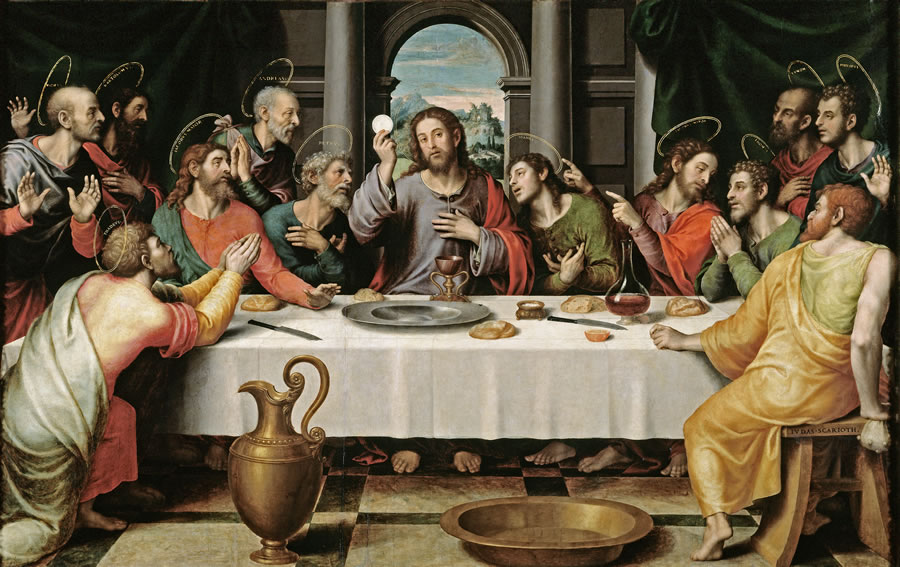
His Body in Service
06-22-2025Weekly ReflectionWe Celebrate Worship Resource, Vol. 49, No. 1The disciples realize they have a problem. They have but five loaves and two fish, and thousands of mouths to feed. No known math could solve this problem. But Jesus' math is different. He who one day would transform a loaf of bread and a cup of wine into his own Body and Blood sacrificed for all of humanity, recognizes the food he can provide will satisfy thousands of hungry people with more left over than they begin with.
Today, millions of people go hungry and countless others need some other important resource, from housing to health care. We may feel as helpless as the disciples did in that deserted place, unable to provide anywhere near enough. But we cannot forget that we are truly the body of Christ.
As the body of Christ, we can offer ourselves up to those in need. When we do so, we can provide food for the hungry, shelter for the homeless, hospitality for the alien, comfort for the grieving, justice for the oppressed, forgiveness for the sinner, hope for the despairing, mercy for the lost and forsaken. This, too, we can do in remembrance of Him.
How does your parish provide for those in need? What else can you do?
-We Celebrate Worship Resource, Vol. 50, No. 1
Su Cuerpo Al Sevicio
Los discípulos se dan cuenta de que tienen un problema. Solo tienen cinco panes y dos peces, y miles de bocas que alimentar. Ninguna matemática conocida podría resolver este problema. Pero la matemática de Jesús es diferente. Él, que un día transformaría una hogaza de pan y una copa de vino en su propio Cuerpo y Sangre sacrificados por toda la humanidad, reconoce que el alimento que puede proveer saciara a miles de hambrientos con más sobras de las que tenían al principio.
Hoy, millones de personas pasan hambre e innumerables otras necesitan algún otro recurso importante, desde vivienda hasta atención medica. Podemos sentirnos tan desamparados como los discípulos en ese lugar desierto, incapaces de proveer ni de cerca. Pero no podemos olvidar que somos verdaderamente el cuerpo de Cristo.
Como cuerpo de Cristo, podemos ofrecernos a los necesitados. Al hacerlo, podemos brindar alimento al hambriento, refugio al desamparado, hospitalidad al extranjero, consuelo al afligido, justicia al oprimido, perdón al pecador, esperanza al desesperado, misericordia al perdido y abandonado. También esto podemos hacerlo en memoria de ÉI.
¿Cómo atiende tu parroquia a los necesitados? ¿Qué más puedes hacer?
-We Celebrate Worship Resource, Vol. 50, No. 1
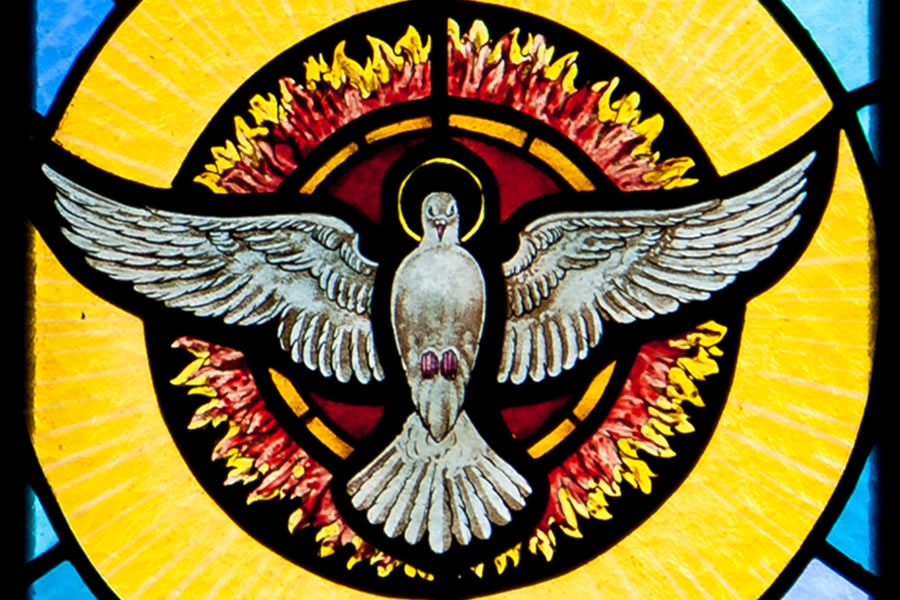
Spirit, Guide Me
06-15-2025Weekly ReflectionWe Celebrate Worship Resource, Vol. 49, No. 1At the Last Supper, Jesus takes advantage of one last chance to speak to his closest friends, telling them many things of great importance. He lets them know that he will send the Holy Spirit, who will remain with them always. He teaches them that he, the Father, and the Holy Spirit are united, that everything that is his is theirs and vice versa.
But he also says, "I have much more to tell you, but you cannot bear it now" (John 16:12). Realizing how difficult it will be for him to bear what will happen over the next few hours, Jesus knows well how hard it will be for them. They will all fall asleep in Gethsemane, Peter will deny him three times, and they will all run away when he is arrested.
But he knows that in time the Holy Spirit will teach the disciples everything they need to know, everything that they eventually will be able to bear. We may recall times in our lives when trauma or tension have made it difficult to bear anything more. Let our faith that the Holy Spirit remains with us always comfort us through those difficult times and guide us when we are able to handle it.
How sensitive are you to when others cannot bear what you want to say?
-We Celebrate Worship Resource, Vol. 50, No. 1
Espíritu, Guíame
At the last supper, Jesus takes the opportunity to speak to his closest friends, telling them many things of great importance. He lets them know that he will send the Holy Spirit, who will remain with them always. He teaches them that he, the Father and the Holy Spirit are united, that all that is His is His and vice versa.
But he also says: “I have yet many things to say to you, but you cannot yet understand them” (John 16:12). Realizing how hard it will be for him to bear what will happen in the next few hours, Jesus knows how hard it will be for them. They will all fall asleep in Gethsemane, Peter will deny him three times, and they will all flee when he is arrested.
But he knows that in time the Holy Spirit will teach the disciples all they need to know, all that they will eventually be able to endure. We can remember the times in our lives when trauma or stress has not allowed us to endure anymore. May our faith that the Holy Spirit remains with us always comfort us in those difficult times and guide us when we are unable to handle them.
How sensitive are you when others can't handle what you want to say?
-We Celebrate Worship Resource, Vol. 50, No. 1

The Transforming Power of the Holy Spirit
06-08-2025Weekly ReflectionWe Celebrate Worship Resource, Vol. 49, No. 1The Holy Spirit has the power to transform us. The first disciples can attest to that. When the Holy Spirit descends upon them, they are able to speak in different tongues, allowing everyone in the crowd to understand them in his or her own language. Jesus tells the disciples that receiving the Holy Spirit enables them to forgive sins.
At the Last Supper, he tells them that the Holy Spirit will teach them and guide them. Saint Paul preaches that the Holy Spirit makes us one, unifying us as one body of Christ, which enables us to recognize that we are all children of God. We are those disciples now, having received the Holy Spirit in baptism and confirmation. The power to be transformed is within us now.
Today's Gospel acclamation calls for the transformation: "Come, Holy Spirit, fill the hearts of your faithful and kindle in them the fire of your love." We may not see literal tongues of fire descending upon us, but the Holy Spirit has the power to fire up our hearts with the love that is Jesus' command, to be offered to God and to our neighbor. For it is that kind of love-the selfless, sacrificial love that Jesus modeled-that can transform us into the kind of person of whom others will say, "the Spirit of God dwells in you" (Romans 8:9).
How will you show the fire of God's love to others this week?
-We Celebrate Worship Resource, Vol. 50, No. 1
El poder transformador del Espíritu Santo
EI Espíritu Santo tiene el poder de transformarnos. Los primeros discípulos pueden dar fe de ello. Cuando el Espíritu Santo desciende sobre ellos, pueden hablar en diferentes lenguas, permitiendo que todos en la multitud los entiendan en su propio idioma. Jesus les dice a los discípulos que recibir el Espíritu Santo les permite perdonar los pecados.
En la Última Cena, les dice que el Espíritu Santo les enseñara y los guiará. San Pablo predica que el Espíritu Santo nos hace uno, unificandonos como un solo cuerpo de Cristo, lo que nos permite reconocer que todos somos hijos de Dios. Somos esos discípulos ahora, habiendo recibido el Espíritu Santo en el bautismo y la confirmacion. El poder de ser transformados esta en nosotros ahora.
La aclamacion del Evangelio de hoy llama a la transformación: "Ven, Espíritu Santo, llena los corazones de tus fieles y enciende en ellos el fuego de tu amor". Puede que no veamos lenguas de fuego descender sobre nosotros, pero el Espíritu Santo tiene el poder de encender nuestros corazones con el amor que Jesus nos manda ofrecer a Dios y al projimo. Porque es ese tipo de amor -el amor desinteresado y sacrificado que Jesús modeló- el que puede transformarnos en el tipo de persona de quien otros diran: "el Espíritu de Dios mora en vosotros" (Romanos 8:9).
¿Como mostraras el fuego del amor de Dios a los demas esta semana?
-We Celebrate Worship Resource, Vol. 50, No. 1

To the Ends of the Earth
06-01-2025Weekly ReflectionWe Celebrate Worship Resource, Vol. 49, No. 1According to the author of Luke and Acts, whom scripture scholars believe to be the same writer, Jesus' final words to his disciples were that they "will be my witnesses ... to the ends of the earth" (Acts 1:8). Certainly his first disciples would make excellent witnesses, for they had spent years with him: living with him, traveling with him, seeing and hearing most everything he did.
But the witnessing did not end with them. We tend to think of eyewitnesses primarily, but people can also witness to something they heard, or felt, or sensed in some other way. This is the kind of witness we can provide. We can witness to the difference Jesus makes in our lives: that he accompanies us in our sufferings, forgives us of our sins, redeems us by his resurrection, promises us eternal life with the Father.
These are the key truths he listed for his disciples at the end of Luke's Gospel; this is what he implicitly leaves for us to witness to as well. Moreover, we already have the Holy Spirit, who guides us as we bear witness. May our witness help extend that forgiveness, reconciliation, and hope to those we meet.
In what way can your witness bring forgiveness to someone else, reconciliation between others, or hope to someone in despair?
-We Celebrate Worship Resource, Vol. 50, No. 1
Hasta los Confines de la Tierra
Según el autor de Lucas y Hechos, a quien los eruditos bíblicos atribuyen al mismo escritor, las últimas palabras de Jesus a sus discípulos fueron: "Serán mis testigos ... hasta los confines de la tierra" (Hechos 1:8). Sin duda, sus primeros discípulos serían excelentes testigos, pues habían pasado años con él: viviendo con él, viajando con él, viendo y oyendo casi todo lo que hacía.
Pero el testimonio no terminaba con ellos. Solemos pensar principalmente en testigos presenciales, pero las personas también pueden dar testimonio de algo que oyeron, sintieron o percibieron de alguna otra manera. Este es el tipo de testimonio que podemos brindar. Podemos dar testimonio de la diferencia que Jesús marca en nuestras vidas: que nos acompaña en nuestros sufrimientos, nos perdona nuestros pecados, nos redime con su resurreccion y nos promete vida eterna con el Padre.
Estas son las verdades claves que enumeró para sus discípulos al final del Evangelio de Lucas; esto es lo que implícitamente nos deja para que también demos testimonio. Además, ya contamos con el Espíritu Santo, quien nos guía al dar testimonio. Que nuestro testimonio ayude a extender ese perdón, esa reconciliación y esa esperanza a quienes nos encontramos.
¿De qué manera puede tu testimonio traer perdón a otra persona, reconciliación entre otros o esperanza a alguien desesperado?
-We Celebrate Worship Resource, Vol. 50, No. 1